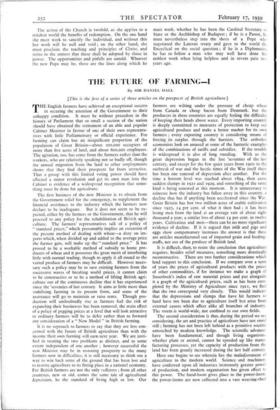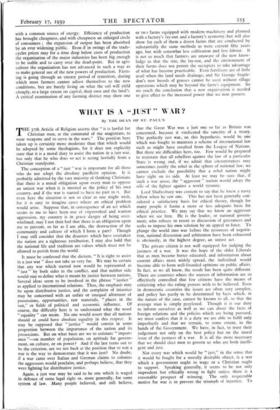THE FUTURE OF FARMING -I
By SIR DANIEL HALL
[This is the first of a series of three articles on the prospects of British agriculture.] THE English farmers have achieved an exceptional success in securing the attention of the Government to their unhappy condition. It must be without precedent in the history of Parliament that so small a section of the nation should have obtained the retirement of an able and popular Cabinet Minister in favour of one of their own representa- tives with little Parliamentary or official experience. For farming can claim but an insignificant proportion of the population of Great Britain—about 200,000 occupiers of more than five acres of land, and about 600,000 employees. The agitation, too, has come from the farmers rather than the workers, who are relatively speaking not so badly off, though the annual migration from the land to other employments shows that they find their prospects far from attractive. That a group with this limited voting power should have effected a minor revolution and get its own man into the Cabinet is evidence of a widespread recognition that some- thing must be done for agriculture.
The first business of the new Minister is to obtain from the Government relief for the emergency, to supplement the financial assistance to the industry which the farmers now declare to be inadequate. But it does not seem to be ex- pected, either by the farmers or the Government, that he will proceed to any policy for the rehabilitation of British agri- culture. The farmers' representatives talk of a policy of " standard prices," which presumably implies an extension of the present method of dealing with wheat—a duty on im- ports which, when divided up and added to the average price the farmer gets, will make up the " standard price." It has proved to be a workable method of subsidy to home pro- ducers of wheat and it possesses the great merit of interfering little with normal trading, though to apply it all round to the varied produce of farmers may be difficult. However neces- sary such a policy may be to save existing farmers from the successive waves of breaking world prices, it cannot claim to be constructive or to be a method of lifting British agri- culture out of the continuous decline that it has experienced since the 'seventies of last century. It aims at little more than stabilising farming in its present form, and some of the assistance will go to maintain or raise rents. Though pro- duction will undoubtedly rise as farmers feel the risk of expanding their businesses has been removed, the main effect of a policy of pegging prices at a level that will look attractive to ordinary farmers will be to defer rather than to forward any consideration of a " New Model " in British farming.
It is no reproach to farmers to say that they are less con- cerned with the future of British agriculture than with the income their own farming will earn next year. We are justi- fied in treating the two problems as distinct, and to some extent independent of one another ; however successful the new Minister may be in restoring prosperity to the many farmers now in difficulties, it is still necessary to think out a way to win back some of the ground that has been lost and to restore agriculture to its fitting place in a national economy. For British farmers are not the only sufferers ; from all other countries, new or old, comes the same tale of agricultural depression, be the standard of living high or low. Our farmers are wilting under the pressure of cheap wheat from Canada or cheap bacon from Denmark, but the producers in these countries are equally feeling the difficulty of keeping their heads above water. Every importing country is deeply committed to measures of protection to keep out agricultural produce and make a better market for its own farmers ; every exporting country is considering means of forcing its surplus through the barriers. The orthodox economists look on amazed at some of the fantastic examples of the combinations of tariffs and subsidies. If the trouble is widespread it is also of long standing. With us the great depression began in the late 'seventies of the last century, and except for the few quiet years from 1900 to the outbreak of war and the hectic times of the War itself there has been one renewal of depression after another. For the time a bottom level was reached about 1894, then came sudden slumps in 1921 and 1929, and something of the same kind is being renewed at this moment. It is unnecessary to reiterate how the industry has fallen away in this country, a decline that has if anything been accelerated since the War. Great Britain has lost two million acres of arable cultivation since 1925, 14 per cent. of what it then had ; it has been losing men from the land at an average rate of about eight thousand a year, a similar loss of about 14 per cent. in twelve years. Cultivation and men—there can be no more significant evidence of decline. If it is argued that milk and pigs and eggs show compensatory increases the answer is that these are articles manufactured out of imported grain and feeding- stuffs, not out of the produce of British land.
It is difficult, then, to resist the conclusion that agriculture requires, besides relief measures, something more drastically reconstructive. There are two further considerations which lend support to this conclusion. If we compare over a term of years the prices of agricultural products with the prices of other commodities, if for instance we make a graph of Sauerbeck's index of raw material prices and put alongside it a graph of the agricultural prices, such as has been com- pleted by the Ministry of Agriculture since 1911, we find that the two correspond very closely. This would indicate that the depressions and slumps that have hit farmers so hard have not been due to agriculture itself but arise from external causes which affect alike all branches of industry. The storm is world-wide, not confined to our own fields.
The second consideration is that, during the period we are considering, the art and practice of agriculture have not stood still ; farming has not been left behind as a primitive routine untouched by modern knowledge. The scientific advances have been fundamental,- and though living organisms. whether plant or animal, cannot be speeded up like manu- facturing processes, yet the capacity of production from the land has been greatly increased during the last half century.
Here one begins to see wherein lies the maladjustment of agriculture to the modern world. Science and machinery have conferred upon all industries immensely greater power of production, and modern organisation has given effect to this power. The hand-loom gives place to the power-loom. the power-looms are now collected into a vast weaving-shed with a common source of energy. Efficiency of production has brought cheapness, and with cheapness an enlarged circle of consumers ; the expansion of output has been absorbed by an ever widening public. Even if in swings of the trade- cycles prices may for a time drop below costs of production the organisation of the major industries has been big enough to be stable and to carry over the dead-point. But in agri- culture the organisation has not advanced in such a way as to make general use of the new powers of production. Farm- ing is going through an uneasy period of transition, during which most farmers cannot adjust themselves to the new conditions, but are barely living on what the soil will yield cheaply, to a large extent on capital, their own and the land's. A critical examination of any farming district may show one or two farms equipped with modern machinery and planned with a factory's lay-out and a factory's economy, but will also show for each of them a dozen farms that are conducted by substantially the same methods as were current fifty years ago, but with somewhat less cultivation and less labour. It is not so much that farmers are unaware of the new know- ledge as that the size, the lay-out, and the environment of their farms does not permit the occupiers to take advantage of what has become practicable. Even fertilisers are of little avail when the land needs drainage, and Sir George Staple- don's new breeds of grasses cannot be used without tillage operations which may be beyond the farm's equipment. So we reach the conclusion that a new organisation is needed to give effect to the increased power that we now possess.











































 Previous page
Previous page